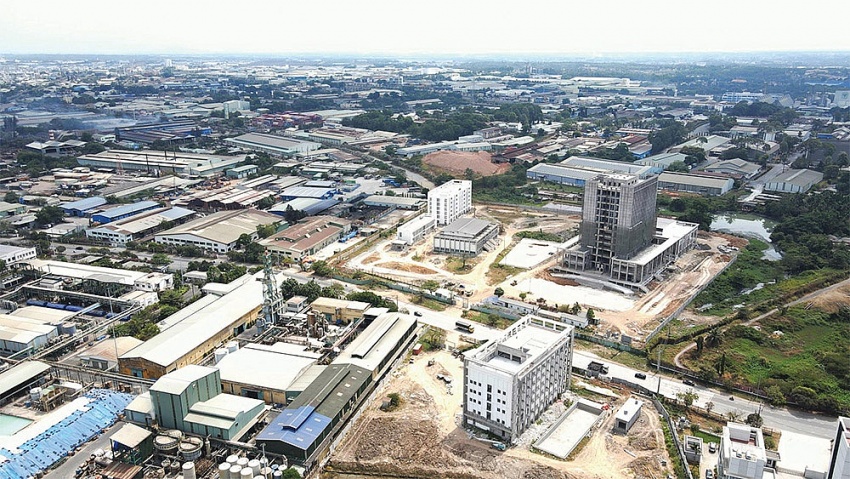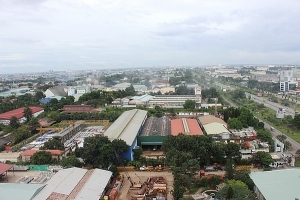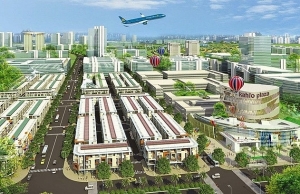Support framework will help mass relocation efforts
Bien Hoa 1 Industrial Park (IP), spanning 335 hectares, was established in 1963 and has been home to 76 companies within the industrial area, employing over 21,000 workers.
The government decided to convert the IP into a modern, civilised urban area in 2021. According to Dong Nai People’s Committee plans approved in February, the goal is to build a new, modern, and sustainable urban area, creating a distinctive landscape for the region and Bien Hoa city as a whole. Additionally, it aims to improve the environment and reduce water pollution in the Dong Nai River system.
Relocating Bien Hoa 1 IP is supposed to be divided into two phases. Phase 1 is expected to be completed before December and will include businesses located in the southern part of Zone 1, adjacent to An Hao bridge, Hanoi highway, and the administrative-political centre of Dong Nai province.
Phase 2, involving businesses in the remaining area, will be completed before 2026.
 |
| Bien Hoa 1 Industrial Park (IP) |
Challenges to be wiped out
Ensuring the successful execution of relocation and addressing the challenges faced by the IP requires focus on several imperatives.
Governmental authorities should undertake meticulous planning to develop a comprehensive roadmap and operational blueprint for the relocation process. This planning should take into account environmental concerns, urban planning imperatives, and the overall vision for the new industrial precincts. By taking a holistic approach, potential issues can be identified and addressed proactively, ensuring a smoother transition.
It is crucial for the government to establish and enforce stringent legislative frameworks. These regulations should set clear environmental benchmarks and sustainable development standards that businesses must adhere to during the relocation process. By implementing and monitoring these regulations, the government can ensure that the new industrial areas are developed in an environmentally responsible manner, minimising the negative impact on the ecosystem.
The government should consider providing financial grants, subsidies, and incentives to enterprises undertaking the relocation process. Financial support from the government can help alleviate these financial burdens, making the transition more feasible for businesses and encouraging their participation in the relocation efforts.
Strategic investments in infrastructure enhancements are essential to support the new industrial precincts surrounding IP within Dong Nai province. This includes improving roads, utilities, and establishing necessary wastewater treatment amenities. The government should prioritise these infrastructural developments to ensure the long-term success of the relocated businesses.
Actively engaging with all stakeholders, including businesses, local communities, and environmental advocacy groups, is vital for a successful transition. The government should foster open communication channels, hold consultations, and address concerns raised by these stakeholders.
Based on baochinhphu.vn, Dong Nai province’s policy proposes the construction of Giang Dien IP in Trang Bom district to accommodate businesses relocating from Bien Hoa 1 IP. If businesses do not agree to relocate there, arrangements will be made to build factories in other clusters or other IPs in the province that are suitable for planning.
Businesses relocating will receive support from the investor in terms of moving, stabilising production and life, land rent, infrastructure use fees, with a total capital of around $708 million.
Most businesses support the relocation and conversion of Bien Hoa 1 IP, but they request specific policies in order to do so. Specifically, Bien Hoa Chemical Company has three factories in the IP, one of which was relocated from Tan Binh district in Ho Chi Minh City. Due to the nature of a basic chemical manufacturing company, wherever the factory goes, it faces rejection.
For Cogido Paper Company, which requires 4,000-5,000 cubic metres of water per day, the province is requested to allocate a suitable location to facilitate environmental pollution treatment.
Some other businesses argue that most of their fixed assets have been fully depreciated, and the remaining asset value is negligible. Therefore, the compensation and relocation support are not enough for them to build new factories.
This is not to mention the difficulties of stopping operations for the factory to move and install machinery and equipment, which may take several years and mean businesses do not have products to supply to customers, leading to the risk of losing customers and market share.
Moreover, when relocating to Giang Dien IP or other IPs, the distance to travel increases by 20-60 km, resulting in additional costs and a loss of skilled labour.
Giang Dien IP has a favourable location as it is close to the expressway and the future Long Thanh International Airport. The steering committee will consider the suggestions of businesses to complete the project and propose to the government and central ministries the specific policies to ensure that businesses are not disadvantaged during relocation.
Incentives and policies
To encourage and support enterprises in their relocation endeavours, the government should establish an incentivisation and support framework. This framework should include several components.
Firstly, the government should provide financial relief measures, tax incentives, and grants to enterprises transitioning to new industrial precincts. This assistance can help alleviate the financial burdens associated with relocation, such as land rental costs, infrastructure development, and moving expenses. By offering fiscal support, the government can incentivise businesses to participate in the relocation process and ensure a smoother transition.
Secondly, it is crucial for the government to ensure that new IPs are equipped with contemporary and efficient infrastructure. This includes providing access to reliable utilities, transportation networks, and communication systems. By investing in the development of necessary infrastructure, the government can catalyse business operations and expansion in the relocated industrial areas.
Thirdly, the government should advocate for the adoption of eco-friendly technologies and sustainable practices in the new industrial precincts. Encouraging businesses to implement environmentally friendly practices, such as energy efficiency, waste reduction, and pollution control, can contribute to a culture of environmental stewardship.
The government can provide incentives, such as grants or tax benefits, to businesses that prioritise sustainability and demonstrate a commitment to minimising their environmental impact.
Fourthly, streamlining the acquisition of permits, clearances, and licences for businesses transitioning to new locations is crucial. The government should establish a simplified and expedited process for obtaining the necessary regulatory approvals.
Last but not least, cultivating synergistic partnerships between businesses, local communities, and governmental entities is essential for a successful relocation. The government should facilitate communication and collaboration between these stakeholders, fostering mutual understanding and collaborative camaraderie. Engaging with local communities and addressing their concerns can help build trust and support for the relocation efforts.
Additionally, involving community representatives in decision-making processes can ensure that the interests of all stakeholders are taken into account.
The seamless transition of Bien Hoa 1 IP requires collaborative efforts between governmental entities, enterprises, and stakeholders. By proactively addressing environmental challenges, streamlining relocation protocols, and providing substantive support and incentives to businesses, the government can ensure a smooth migration to new industrial precincts.
Through holistic planning, financial subsidies, and infrastructural enhancements, the transformation of industrial enclaves lacking in environmental safeguards can be achieved, paving the way for a cleaner, more sustainable industrial landscape in Vietnam.
 |
| Meir Tlebalde, CEO and Nguyen Vu Anh, head of Industrial and Business Development at Sunwah Kirin Vietnam |
 | Dong Nai wants to transform Bien Hoa 1 industrial park into smart city Dong Nai People’s Committee has proposed repurposing 324 hectares of land at Bien Hoa 1 industrial park – the oldest IP in Vietnam – to build a smart urban area in its place. |
 | Industrial park removal faces standstill The proposal on changing Bien Hoa 1 Industrial Park (IP) usage functions was approved by the prime minister, affecting businesses, however, have multiple reasons for concerns. |
 | Bien Hoa Industrial Park to close Dong Nai Province has been working with agencies on a project to turn Bien Hoa I Industrial Zone into a commercial and service centre. |
What the stars mean:
★ Poor ★ ★ Promising ★★★ Good ★★★★ Very good ★★★★★ Exceptional
Related Contents
Latest News
More News
- An Phat 5 Industrial Park targets ESG-driven investors in Hai Phong (January 26, 2026 | 08:30)
- Decree opens incentives for green urban development (January 24, 2026 | 11:18)
- Public investment is reshaping real estate’s role in Vietnam (January 21, 2026 | 10:04)
- Ho Chi Minh City seeks investor to revive Binh Quoi–Thanh Da project (January 19, 2026 | 11:58)
- Sun Group launches construction of Rach Chiec sports complex (January 16, 2026 | 16:17)
- CEO Group breaks ground on first industrial park in Haiphong Free Trade Zone (January 15, 2026 | 15:47)
- BRIGHTPARK Entertainment Complex opens in Ninh Binh (January 12, 2026 | 14:27)
- Ho Chi Minh City's industrial parks top $5.3 billion investment in 2025 (January 06, 2026 | 08:38)
- Why Vietnam must build a global strategy for its construction industry (December 31, 2025 | 18:57)
- Housing operations must be effective (December 29, 2025 | 10:00)

 Tag:
Tag:




















 Mobile Version
Mobile Version